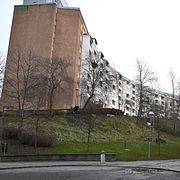Wikipedia (en)
Hizb ut-Tahrir (Arabic: حزب التحرير Ḥizb at-Taḥrīr; Party of Liberation) is an international, pan-Islamist political organization, which describes its ideology as Islam, and its aim as the re-establishment of the Islamic Khilafah (Caliphate) or Islamic state to resume the Islamic way of life. The new caliphate would unify the Muslim community (Ummah) in a unitary (as opposed to federal) nation, composed of unified Muslim-majority countries spanning from Morocco in North Africa to the southern Philippines in South East Asia. The proposed state would enforce the Shariah, and return to its "rightful place as the first state in the world", and carry the Da'wah of Islam to the rest of the world.The organization was founded in 1953 as a Sunni Muslim organization in Jerusalem by Taqiuddin al-Nabhani, an Islamic scholar and appeals court judge (Qadi) from Haifa. Since then Hizb ut-Tahrir has spread to more than 50 countries, and grown to a membership estimated to be between "tens of thousands" to "about one million". Hizb ut-Tahrir is very active in Western countries, particularly in the United Kingdom, and also in several Arab and Central Asian countries, despite being banned by some governments. Members typically meet in small private study circles, but in countries where the group is not illegal (such as Europe) it also engages with the media and organizes rallies and conferences.The basis of the party's ideological structure has been described by the writings of its late founder al-Nabhani, as "unchanged in the last 50 years" and unlikely to be, as "any major changes" might "undermine" party unity. The party itself claims its "ideology and its method of work" has been "meticulously thought out and published in many detailed books."Al-Nabhani also developed a program and "draft constitution" for the caliphate, which would be run by a caliph head of state elected by Muslims. Articles of the constitution detail such points as metals to be used in currency (silver and gold), the age at which Muslims males will begin military training (15), the "sole language of the state" (Arabic), and obedience of wives to their husbands. Anti-Zionism and the belief that the State of Israel is an "illegal entity" to be "dismantled" or "destroyed" without compromise, is an important element of party doctrine.Hizb ut-Tahrir has been described as "controversial", and as of mid 2015 it was banned in Germany, Russia, China, Egypt, Turkey, and all Arab countries except in Lebanon, Yemen, and UAE. In July 2017, the Indonesian government formally revoked Hizbut ut-Tahrir's charter, citing incompatibility with government regulations on extremism and national ideology. Some observers believe it is a victim of unjust and untrue allegations of connections to terrorism as the organization has never been "overtly involved" in terrorism or even any "violent actions"; that its role in radicalization of young Muslims has been "exaggerated", and/or that the re-establishment of its caliphate would provide stability and security. In March 2017, at a public forum in Sydney Australia, a Hizb ut-Tahrir spokesman was asked about Article 7c of the Hizb ut-Tahrir constitution. In response, he said, "Islam is clear that apostates do attract capital punishment, we don't shy away from that."
Critics and others argue that the party is engaged in "politics of hatred" and intolerance which is a "natural precursor" of and provides ideological justification for violence;
that actions such as calling suicide bombers "martyrs", accusing western countries of waging war on Islam and Muslims,
or calling for the destruction of Hindus in Kashmir, Russians in Chechnya and Jews in Israel—are extremist; or that it opposes violence and military expansion not in principle but only until its "Islamic state" has been established.




